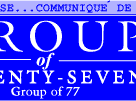



 |
 |
 |
 |
|
Ambassador Bagher Asadi (Islamic Republic of Iran), Chairman
|
|
FOR
IMMEDIATE WORLDWIDE RELEASE IN THE G-77 CHAPTERS:
GENEVA - NAIROBI - PARIS - VIENNA - WASHINGTON, D.C. |
The Tehran Consensus concludes momentous gathering of developing nations |
G-77 members to consolidate the South-South cooperation platform |
|
Tehran, 23 August 2001 – A historic gathering of over 100 delegations from G-77 governments, agencies of the United Nations and institutions of the South, who had come together to discuss practical ways to strengthen the economic independence of the developing countries in a fast globalizing economy, concluded Monday in Tehran with the adoption by acclamation of the Tehran Consensus. The adoption coincides with the twentieth anniversary of the adoption of the Caracas Programme of Action. The Tehran Consensus is an expression of the G-77 member states´ resolve to move forcefully and urgently forward on the pressing issues of common concern to the developing world in the context of South-South cooperation. Sponsored by the Group of Seventy-Seven, the tenth meeting of the Intergovernmental Follow-up and Coordination Committee on Economic Cooperation (IFCC-X) took place on 18-22 August, under the auspices of His Excellency Ambassador Bagher Assadi, Chairman of the Group of Seventy-Seven and President of the Conference. The IFCC is a high level forum that monitors and reviews actions by member countries in the field of South-South Cooperation. The Committee was established in line with the provisions of the Caracas Programme of Action that was adopted by the G-77 in 1981. The Tehran Consensus calls for a realistic, objective assessment of the Group´s plans with a view to consolidating them. It provides for the building of stronger South institutions at the global level through “coordinated policies and joint negotiating positions on major issues on the international agenda,” adding that, “immediate steps should be taken to expand and strengthen the Secretariat of the Group of 77 in New York in order to provide greater support to the activities of the Group,” s decided by the first ever G-77 South Summit Held in April 2000 in Havana-Cuba. The Consensus further recognizes that readily available data and a global overview of South-South cooperation are lacking and stresses the urgent need to close “this information and knowledge gap. Calling South-South cooperation “a common endeavor of peoples and countries of the South, based on their common objectives and solidarity,” the Conesus calls on member states to build road-based partnerships that involve, “not only Governments but also the private sector, academic institutions, civil society organizations. “ “South-South cooperation has suffered from benign neglect,” reads the Consensus, calling the overall policy “fragmented with limited financial resources.” It urges the international community to reexamine their approach and provide vigorous catalytic support, to all forms of South-South cooperation. The Consensus goes on to reaffirm the role of the United Nations Development Programme in supporting South-South cooperation and in advocating more inclusive. Representing United Nations Secretary-General Kofi Annan at the conference, UNDP Administrator Mark Malloch Brown highlighted the role that the United Nations can play in integrating developing countries into a globalizing economy “on terms that further our shared goals of gender-equality, poverty eradication, and growth with equity.” Participants noted the timing of the conference as “taking place in this very auspicious year of Dialogue among Civilizations.” The Year of Dialogue among was initiated by the Islamic Republic of Ira and reflects “both the letter and spirit for mutual reinforcing the South-South cooperation and relations with our developed partners.” In his opening message to the conference, President of the Islamic Republic of Iran, H.E. Seyed Mohammad Khatami called on developing nations to “put South-South cooperation on a new course,” adding that, “the message from Tehran should be a message of resolve, creativity and hope.” In his closing address, His Excellency Ambassador Assadi called the Tehran consensus “a historic document deeply rooted in an objective, bold assessment of the state of South-South cooperation,” adding that the Consensus “goes beyond the routine and mundane and espouses a consensus vision on the part of the developing world. The Chairman of the Group of Seventy-Seven and the President of the Conference went on to say, “ the message to the United Nations system, relevant international institutions and the donor community, is very clear and unmistakable – the time has come for all of them to deliver.” The Group of Seventy-Seven represents 133 countries, including China, and is the largest coalition of developing countries in the world. For Further information please contact: ------ |
|
Office
of the Chairman of the Group of 77
|
|
Room
S-3959, United Nations Secretariat, New York, NY 10017, USA
|
|
Phone:
(212) 963-4777/3816 | Fax: (212) 963-3515 | Email: g77off@unmail.org
|
|
All
press communiques are available online at: www.g77.org
|